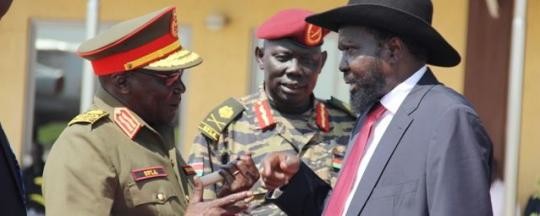A panel of investigators for South Sudan has asked the UN Security Council to blacklist “high-level decision makers responsible for the actions and policies that threaten the peace, security and stability of the country.”
In a confidential report seen by Radio Tamazuj, the UN-appointed experts named President Salva Kiir, army chief-of-staff Paul Malong, National Security Service chief Akol Kur and rebel leader Riek Machar as meeting the criteria for UN sanctions.
The Panel of Experts was established by a Security Council resolution in 2015. This panel is mandated to recommend which individuals should be subject to an international travel ban and asset freeze, though a higher-level Security Council sanctions committee is actually responsible for adopting their recommendations or not.
The experts cited “clear and convincing evidence… that the majority of acts of violence committed in the course of the war by government-affiliated forces, including targeting of civilians and violations of international human rights law, has been directed by senior individuals at the highest levels of government or undertaken with their knowledge, including Kiir, Malong and the director general of the NSS Internal Security Bureau, Akol Kur.”
Findings by the UN experts echo those of the African Union Inquiry report by former Nigerian president Olusegun Obesanjo, which said that war crimes and crimes against humanity “were committed pursuant to or in furtherance of a State policy.”
The Panel report cites meetings and communications between Malong and army and militia commanders in Unity State before and during the dry season offensive of 2015, during which many atrocities were committed, as well as distributions of supplies and ammunition to troops and ethnic militias in this state and elsewhere.
“A group of senior security officials [Malong, Lt. Gen. James Ajongo, Lt. Gen. Malual Ayom, Lt. Gen. Malek Ruben, and NSS chief Akol Kur] planned the offensive starting in January 2015 and subsequently oversaw its execution that spring and throughout the summer, with ultimate command responsibility remaining with Malong.”
The UN experts say that they interviewed senior personnel in the SPLA to corroborate their claims about this offensive and who was responsible for it.
Another accusation is that security chief Akol Kur oversaw the supply of weapons to ethnic militias in Unity State, with state-run oil company Nilepet used as a vehicle for arms purchases. Kur is also a board member of Nilepet.
Militia operations in Unity State were overseen by SPLA Maj. Gen. Thayip Gatluak Tai Tai and Maj. Gen. Matthew Puljang, among others, with assistance from local county commissioners including John Bol Mayak of Mayom, Gordon Koang Biel of Koch, Kor Gatmai Garang of Mayendit, and Wai Yach Gatkuoth of Leer.
According to the report, Kur also was involved in arming an ethnic militia that was mobilized prior to the start of the war: “In 2013, Kur bypassed Oyay Deng Ajak, then the minister for National Security, and went straight to the presidency to facilitate the acquisition of the Israeli ACE rifles cited in the Panel’s interim report (S/2015/656). (These ACE rifles were handed out to members of the Mathiang Anyoor from the Presidential Palace as they targeted Nuer in Juba in December 2013).”
Though the Panel said the government committed the majority of violence since May 2015 in South Sudan, the Panel found that violence perpetrated by opposition forces was also directed “at the highest levels” or undertaken with their knowledge, including by Riek Machar, head of the SPLM-IO. Machar “continues to seek funding and weapons to prosecute the war and to further his personal political ambitions at the expense of peace,” reads the report.
File photo: Gen. Paul Malong (left), Gen. Marial Chanuong (center), Gen. Salva Kiir (right)




